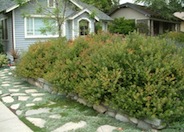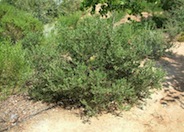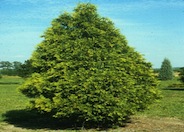
Common name:Concha California Lilac
Botanical name:Ceanothus 'Concha'
Concha is a lilac that grows 6'-8' in height and width. It has small narrow leaves with intense dark blue flower clusters in spring. It is tolerant of coastal and inland conditions. -Cornflower Farms

Common name:Potato Vine
Botanical name:Solanum laxum
This twisting vine will grow 25' in length and has deciduous, glossy green leaves with blue and white flowers that are in constant bloom.

Common name:Catalina Cherry
Botanical name:Prunus ilicifolia ssp. lyonii
The Catalina cherry is an evergreen tree or shrub that grows 15'-40' high and wide. It develops showy white flowers in the spring and red fruit in the fall. It is resistant to oak root fungus. The Catalina cherry is native to California, is drought tolerant, is a beneficial insect plant, and attracts butterflies. -Cornflower Farms

Common name:Sunset Manzanita
Botanical name:Arctostaphylos 'Sunset'
This manzanita is a mounding shrub 4'-5' high and 4'-6' wide. It has coppery red new growth, then later turning bright green. It has pinkish-white flowers in winter to early spring. - Cornflower Farms

Common name:Sentinel Manzanita
Botanical name:Arctostaphylos densiflora 'Sentinel'
This Manzanita grows 6'-8' high and 5'-8' wide; it has rose/white flowers and is upright. It needs good soil drainage for best performance.

Common name:Golden Pyramidal Arborvitae
Botanical name:Thuja occidentalis 'Douglasii Aurea'
This larger shrub will grow to about 15' tall and 10' wide. It has small, scaled, light green and yellow green leaves. This is a highly combustible plant.

Common name:Mexican Fan Palm
Botanical name:Washingtonia robusta
The Mexican Fan Palm is a very tall, rapidly growing palm with large, fan-shaped leaves. It has a tropical look, and can grow several feet a year. This species is excellent for larger gardens and lining streets and avenues.
Sustainable Fertilization
If you mulch heavily as recommended in the compost and mulch fact sheets you should not need traditional fertilization. Sustainable landscapes fertilize themselves as soil organisms break down and recycle the dropped leaves into nutrients.
Click in the green box for more information
| Designer: Dave Buchanan Ocean Sage | Privacy Plants |
Photographer: GardenSoft |
Soils and Compost:
Practice grass-cycling by leaving short grass clippings on lawns after mowing, so that nutrients and organic matter are returned to the soil.
Water Saving Tip:
Be sure to fix all leaks promptly no matter how small they may seem.
Integrated Pest Management:
Drip and other smart irrigation delivers water directly to roots, allowing no excess water for weeds.

